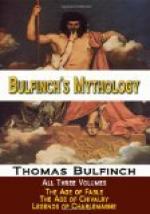To secure the helmet from the possibility of falling, or of being struck off, it was tied by several laces to the meshes of the hauberk; consequently, when a knight was overthrown it was necessary to undo these laces before he could be put to death; though this was sometimes effected by lifting up the skirt of the hauberk, and stabbing him in the belly. The instrument of death was a small dagger, worn on the right side.
ROMANCES
In ages when there were no books, when noblemen and princes themselves could not read, history or tradition was monopolized by the story-tellers. They inherited, generation after generation, the wondrous tales of their predecessors, which they retailed to the public with such additions of their own as their acquired information supplied them with. Anachronisms became of course very common, and errors of geography, of locality, of manners, equally so. Spurious genealogies were invented, in which Arthur and his knights, and Charlemagne and his paladins, were made to derive their descent from Aeneas, Hector, or some other of the Trojan heroes.
With regard to the derivation of the word “Romance,” we trace it to the fact that the dialects which were formed in Western Europe, from the admixture of Latin with the native languages, took the name of Langue Romaine. The French language was divided into two dialects. The river Loire was their common boundary. In the provinces to the south of that river the affirmative, yes, was expressed by the word oc; in the north it was called oil (oui); and hence Dante has named the southern language langue d’oc, and the northern langue d’oil. The latter, which was carried into England by the Normans, and is the origin of the present French, may be called the French Romane; and the former the Provencal, or Provencial Romane, because it was spoken by the people of Provence and Languedoc, southern provinces of France.
These dialects were soon distinguished by very opposite characters. A soft and enervating climate, a spirit of commerce encouraged by an easy communication with other maritime nations, the influx of wealth, and a more settled government, may have tended to polish and soften the diction of the Provencials, whose poets, under the name of Troubadours, were the masters of the Italians, and particularly of Petrarch. Their favorite pieces were Sirventes (satirical pieces), love-songs, and Tensons, which last were a sort of dialogue in verse between two poets, who questioned each other on some refined points of loves’ casuistry. It seems the Provencials were so completely absorbed in these delicate questions as to neglect and despise the composition of fabulous histories of adventure and knighthood, which they left in a great measure to the poets of the northern part of the kingdom, called Trouveurs.




